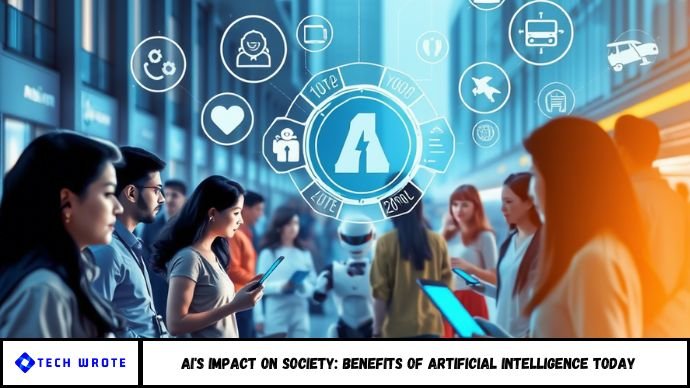Artificial Intelligence (AI) is revolutionizing how we live, work, and interact. From healthcare innovations to automation in business, AI’s impact on society is undeniable. This article explores AI’s transformative role in major sectors, highlights real-world benefits, and offers insights into what the future holds—ensuring you’re informed and ahead of the curve.
What if machines could learn, think, and make decisions like humans? That’s no longer a futuristic concept—it’s the reality of artificial intelligence (AI) today. From virtual assistants that respond to your voice to algorithms that predict your next online purchase, AI is deeply woven into our daily lives.
AI refers to the ability of machines to mimic human intelligence—learning from data, adapting to new information, and performing tasks that once required human input. Its influence is growing rapidly across industries, from healthcare and finance to education and entertainment, improving efficiency, reducing costs, and unlocking new opportunities.
Introduction: Is Artificial Intelligence Reshaping Our World?
“AI is the new electricity.” — Andrew Ng, AI Pioneer
From self-driving cars to ChatGPT helping students and businesses daily, artificial intelligence is no longer science fiction—it’s embedded in our lives. But how is it truly impacting our world? This article explores how AI is changing everyday life, industries, and global development. You’ll learn:
- How AI is reshaping the workplace
- The role of AI in healthcare, education, and finance
- Real data showing AI’s growing influence
- What challenges and ethical concerns lie ahead
1. AI in Everyday Life: More Than Just Smart Devices
AI surrounds us, often without us noticing.
Key examples include:
- Voice assistants (like Siri, Alexa): Use natural language processing to understand and respond.
- Recommendation engines (Netflix, Amazon): Analyze preferences to personalize experiences.
- Navigation and maps: Apps like Google Maps use AI for real-time traffic predictions.
These tools simplify tasks and enhance efficiency, saving time and effort daily.
2. The Workplace Revolution: Automation & Job Evolution
AI is changing how work gets done, not just replacing jobs—but reshaping them.
Here’s how:
- Automation of repetitive tasks: AI handles data entry, scheduling, and customer queries.
- Enhanced productivity: According to McKinsey, AI can boost global productivity by up to 40%.
- Job transformation: World Economic Forum predicts AI will displace 85 million jobs by 2025—but create 97 million new ones.
Adaptability and upskilling are now crucial for staying relevant in AI-driven workplaces.
3. Healthcare Transformed: Smarter, Faster, More Accurate
AI’s impact on healthcare is life-changing.
Real-world benefits include:
- Early disease detection: AI identifies signs of cancer, heart disease, and neurological issues sooner.
- Faster diagnostics: Tools like IBM Watson Health analyze medical records instantly.
- Predictive analytics: Hospitals use AI to forecast patient needs and prevent overcrowding.
According to PwC, AI in healthcare could save over $150 billion annually in the U.S. alone by 2026.
4. AI in Education: Personalized and Accessible Learning
Education is evolving through AI-driven platforms.
- Adaptive learning systems adjust content based on student pace and learning style.
- 24/7 tutoring support from AI bots enables on-demand help.
- Accessibility: AI breaks language and ability barriers with translation and voice-to-text tools.
This shift empowers both students and teachers with smarter, more inclusive learning.
5. Financial Services: Safer, Smarter, and More Efficient
In banking and finance, AI reduces risk and increases efficiency.
- Fraud detection: AI flags unusual transactions in real time.
- Robo-advisors: Provide automated, data-backed investment advice.
- Customer service: AI chatbots handle millions of interactions with minimal errors.
Gartner predicts that by 2030, AI will manage over 70% of customer service interactions—without human involvement.
6. Ethical Challenges and the Future of AI
With great power comes great responsibility.
Key ethical concerns include:
- Bias in algorithms: AI systems can unintentionally reflect human prejudices.
- Privacy: AI’s hunger for data raises serious security and consent issues.
- Autonomy: Where do we draw the line between automation and human decision-making?
Governments and tech companies must collaborate to create transparent, fair AI systems that benefit all.
Explore More on This Topic
Top 12 Benefits of Cloud Computing for Business Growth
AI in Software Development | Boost Code Speed & Accuracy
Software Development Security | Protect Code & Data Now
FAQ
1. How is AI used in daily life?
AI powers apps, smart devices, voice assistants, and online recommendations.
2. Will AI take over jobs?
Some roles will change, but many new jobs will emerge. Upskilling is key.
3. Is AI safe to use?
Yes, with proper regulations and ethical use, AI can be safe and beneficial.
4. How does AI improve healthcare?
It aids in faster diagnosis, early detection, and personalized treatment.
5. Can AI help in education?
Yes, it personalizes learning, supports teachers, and increases access.
6. What’s the future of AI?
Expect smarter, more integrated systems—with a focus on ethical development.
Conclusion
AI is more than a technological trend—it’s a societal shift. Whether it’s helping doctors save lives or transforming classrooms, artificial intelligence is deeply embedded in modern life. As AI continues to grow, we must balance innovation with ethics, ensuring its power is used responsibly and inclusively


